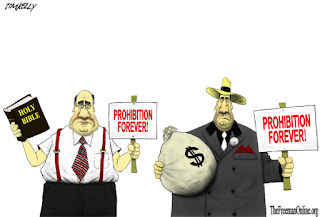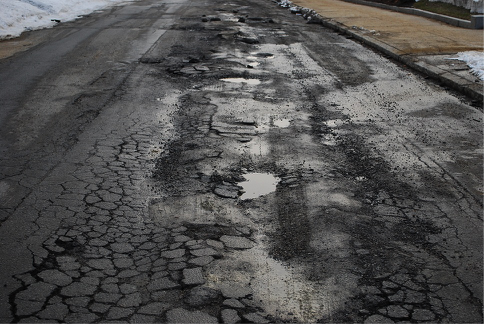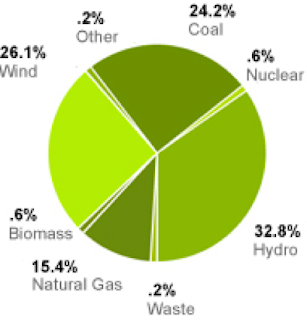A quick Google search suggests that the phrase “politics makes for strange bedfellows” first appeared in an ancient Sanskrit text and was probably in fairly wide usage when Charles Dudley Warner in My Summer in the Garden (1870) punned “raspberries are sprawled all over the strawberry-beds: so true is it that politics makes strange bedfellows.”
Economics has its own special version of this trope, which goes to an explanation of the shape and kind of government regulation of business, especially at state and local levels: bootleggers-and-Baptists coalitions. In the canonical example, bootleggers and Baptists partnered to provide the support needed to keep the Deep South legally dry after the repeal of the Eighteenth Amendment in 1933. The Baptists were ‘agin drinkin’ and the bootleggers needed the states to protect them from legal competition to stay in business. Moreover, both found it easy to demonize their opponents, the liquor lobby.

Nowadays the most common example of this phenomenon occurs where industry partners with environmentalists to obtain a special competitive advantage. Here in Oregon, it is perhaps best exemplified by the so-called ‘Clean-Fuels Program,’ which joins the environmentalist good guys with ‘local clean fuels producers’ against out-of-state fossil fuel interests.
The best thing about this Program is that it will raise motor fuel costs. Clearly the way to discourage carbon emissions is to make them more expensive, which the Clean Fuels Program does, albeit in a very roundabout way.
Beyond increasing prices at the pump, the efficacy of Oregon’s Clean Fuels Program depends upon the aggressive deployment of biomass on the assumption that the use of biofuels is carbon-neutral, that plants pull CO2 back from the air when they grow, offsetting the carbon emitted from burning them as fuel, which is all true. But diverting a cornfield or a forest to produce energy means not using it to do something else, like make food or store carbon. Consequently, using biomass to produce energy could change land uses, food supply and ecosystems without actually affecting climate change.
Supporters of the Clean Fuels Program correctly note that it does not require any deployment of biomass, nor does it score fuels with the assumption that all bio-fuels are carbon neutral. As the Oregon Environmental Council explains: “The Clean Fuels Program … gives the oil industry options to either blend low-carbon biofuels or purchase credits from clean fuel providers for fuels … propane, natural gas, sustainable biofuels, biogas and electricity,” which on the face of it sounds like a pretty smart arrangement,
However, whether it is or not depends on the carbon scoring. Unfortunately, the scoring used by DEQ (which they wanted to change but were prevented from doing so) ignores the ecological opportunity cost of alternative fuels.

It is also the case that the local producers supporting this program are almost entirely in the biofuels/biomass business. Moreover, they strongly opposed the DEQ’s rescoring to better account for ecological opportunity costs. Consequently, most of the purported gains from the Clean Fuels Program come from substituting biofuels for fossil fuels. Scoring of electricity is equally biased since it ignores the fact that, at the margin, electricity is produced by burning fossil fuels. None of the other options available are currently competitive with gasoline/diesel fuel, which is a pity.
IMHO, Oregon, like BC, needs a carbon tax, but getting there is far more likely via substitution of motor fuel taxes. In Oregon a portion of taxes collected on motor fuels is earmarked for county roads and municipal streets and thoroughfares, but that proportion has been cutback to protect state-responsibility highways, and municipalities and counties have very few degrees of freedom with respect to increasing revenue. Clackamas County, for example, has 1400 miles of county roads, they have enough money to budget for about half of the routine maintenance needed to keep to roads from getting worse. It costs about 25K/mile to chip coat the roads to fill fissures, which, if left open, allow the roads quickly to deteriorate. A badly deteriorated road can cost as much as $400K/mile to rebuild. Only 20% of the roads are in good or better condition. The rest are in fair to poor condition.
The legislative leadership had worked out a compromise that might have been practicable – a substantial increase in motor-fuel-taxes, combined with indexing it to inflation, and further study of applying the weight-use-mile tax to personal vehicles (which is now monitored on commercial vehicles using GPS devices), in return for allowing the so-called ‘clean-fuels’ law to lapse. Then the young Turks in the D party rammed thru an extension of the ‘clean fuels bill’ in the face of 100 percent R opposition and that of a handful of Ds, on the assumption that the Rs would have to hold their noses and pass an increase in motor fuels taxes anyway, that their allies at the municipal and county levels as well the Association of Oregon Industries would demand it. Right now the Rs are hanging tough and refusing to support an increase unless the Ds repeal the ‘clean-fuels’ bill. We’ll see how that turns out. In theory, Ds need only one R defection in the Oregon House to get what they want and there are Rs in Portland metro who should cave. I say, in theory, because there are also Ds who are predisposed to defect in the other direction, folks who would rather have the clean-fuels bill than a transportation package.

I don’t doubt that the Oregon Economic Council are the good guys. But this is not good legislation and the OEC’s business allies aren’t necessarily good guys either (for that matter, neither are a lot of the supporters of a transportation package). The question isn’t really who to get in bed with, but what’s the greater good for Oregonians.

Disclaimer: Articles featured on Oregon Report are the creation, responsibility and opinion of the authoring individual or organization which is featured at the top of every article.

